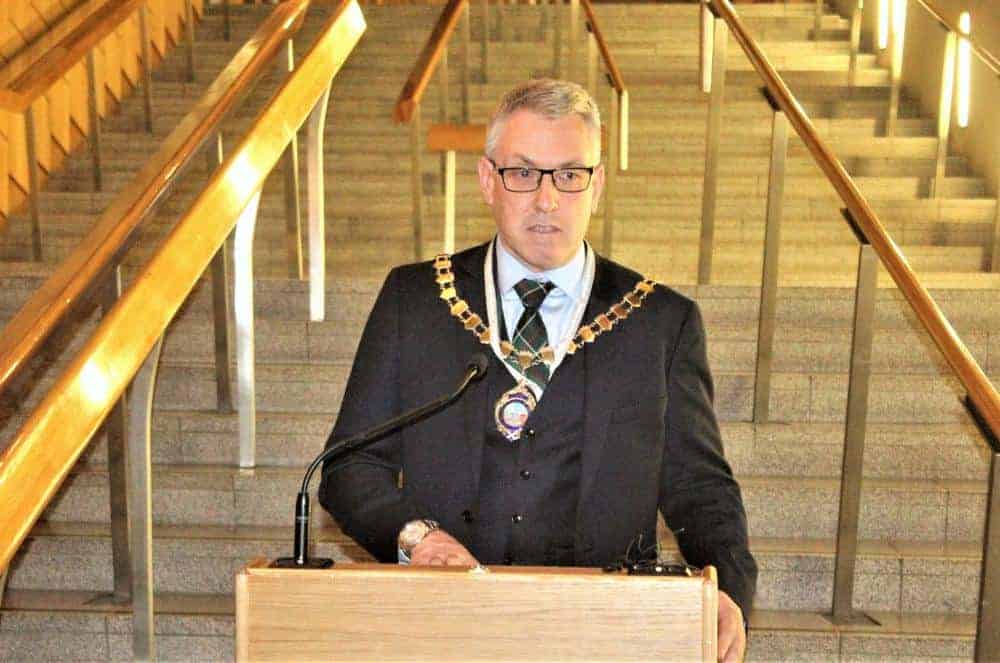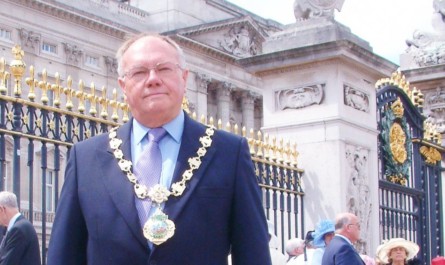Funding, low emission zone exemptions and a new Licensing Bill going through Parliament important successes in Scotland, says Alex James Colquhoun.
Alex James Colquhoun, Chairman of the Scottish Section of the Guild, is no stranger to the Scottish Parliament.
As Vice Chairman of the Section (alongside Philip Paris as Chairman), he began spending time in Holyrood, meeting MSPs and introducing them to the identity, cultural heritage and needs of showmen.
Over the years, in working to improve the lot of Scottish showpeople, Alex James gained the respect of those MSPs, as well as of local councillors.
And the relationships built over that time have proved very beneficial in terms of support for the showmen on some fundamental issues, most recently with funding during the pandemic.
Success started to come back in 2011, in Philip Paris’ last year as Chairman, when the Cross-Party Group on the Scottish Showmen’s Guild was formed, thanks to the help of Christina McKelvie MSP. Richard Lyle MSP was elected Convenor of the group.
In late 2017, Mr Lyle launched his proposed Licensing of Funfairs (Scotland) Bill. The Bill is currently progressing through the committee stages.
Mr Lyle himself is stepping down from Parliament in the May elections and it is yet to be confirmed who will take the Bill forward in the new session.
Funding and recognition for showmen
When the Covid-19 crisis hit, Alex James was just a couple of months into his second stint as Section Chairman. As the UK went into lockdown on 23rd March, Scotland lost its biggest fair of the year, Kirkcaldy Links Market that takes place in April, but there were still hopes that when lockdown ended, things might get back to normal.
It soon became apparent, however, that ‘normal’ wasn’t going to return any day soon.
As summer approached, showmen were given the green light to re-open fairs from 15th July, the same day as pubs, restaurants and other businesses. Days later, showmen were told they had to close again.
The Scottish government subsequently apologised for giving out the wrong advice on funfairs, with Economy, Fair Work and Culture Secretary, Fiona Hyslop describing the error as “unfortunate and regrettable”.
Feeling that showmen hadn’t been given a fair crack of the whip, the Chairman wrote to the First Minister and was supported by letters from MSPs such as Richard Lyle and Christina McKelvie, Glasgow East MP David Linden, and Ivan McKee MSP, minister for trade, investment and innovation.
Alex James then set about trying to get funding to help showmen. After being passed from department to department, he eventually got through to the right people and “got lucky”.
He asked for a £10,000 business grant per member, the same amount as rateable properties in the UK. “I didn’t really expect to get it”, he said, “but we did”.
After pursuing the matter over about four months, Kate Forbes MSP announced on 10th December that a £1.5 million funding package had been set aside for showmen in Scotland – this included AIS, ACES and other organisations, not simply Guild members.
The £10,000 figure was adjusted where a showman had already had another relevant grant.
There were, of course, criteria that had to be met in order to qualify but over the period it was available, around 149 showmen – most of the showmen based in Scotland – qualified and received their grants.
The application period is now closed, but the Chairman is busy trying to get a second round of funding.
The grant did highlight certain issues. The Scottish Section includes Carlisle and other parts of Cumbria where a number of showmen live. These members did not qualify for the grant as it only applied to showmen who live and operate in Scotland.
Conversely, there were members of other Sections who are based in Scotland and so they did qualify.
There was also some confusion as to who the money was paid to – not the Guild, as some believed, but direct to individual showmen on application, as long as they met the criteria.
The Section provided the government with a list of 505 fairs that were cancelled over the year, but had no input whatsoever into who was granted funding, they merely confirmed Guild membership number and that the member operated equipment.
The grant has been a major success not only in terms of the money, but also the recognition of showmen and the big part they play in Scotland’s culture (the grant comes from cultural funds).
“The recognition alone is very important,” the Chairman told World’s Fair.
MSPs Kate Forbes, Fiona Hyslop and Fergus Ewing were all instrumental in achieving the grant and the Chairman remains very grateful for their help.
Alex James is now actively pursuing top-up amounts for this year, given that the grant was in respect of last year’s closures.
Low Emission Zones
December’s grant success was quickly followed by more good news in January. Showmen’s vehicles were to be included as exempt from Low Emission Zone (LEZ) charges under draft legislation.
Four cities currently – Glasgow, Edinburgh, Aberdeen and Dundee – have plans to introduce Low Emission Zones once the Bill has passed through Parliament. (Glasgow already has an LEZ but it applies to local service buses only).
The exemption is the result of considerable lobbying by the Section, using the examples of other cities such as London, Birmingham and Leeds. Again, the MSPs were a great help, particularly Richard Lyle.
“It was Richard who pushed the issue on”, the Chairman said. “He got us a seat at the table, we were able to go and have discussions with the right people and we managed to get showmen’s vehicles written into the exemptions.”
“It’s a fantastic step forward.”
In particular, the proposed Edinburgh LEZ is a much larger area than the one in Glasgow, so the exemption will be especially helpful there.
Support from politicians
Alex James firmly believes that time spent in the Parliament building, as well as the Scottish Section luncheons, have been fundamentally important in achieving these successes.
“The MSPs that we worked with years ago have now moved up and are part of government and that has helped us a great deal”, he said. “We weren’t going from a standing start, we already had support in the right place.”
Likewise, councillors who have attended the Section luncheon have also given support, which is crucial in local issues.
Where councillors move into parliament, they take with them a knowledge of who showmen are, their needs and the problems they face and can be in a better position to help. Alison Thewliss is one such example; she is now MP for Glasgow Central.
The value of the luncheons in fostering relationships with authorities both local and national should not be underestimated, the Chairman believes.
The Section has tried different formats and settled on a Friday event. As Parliament doesn’t sit on Fridays, it was easier for MSPs to attend and the atmosphere could be more informal and relaxed.
This year, after discussions going back some years, showmen are included as a category in the census (this has also now been agreed in England), further evidence of the long-overdue recognition of showmen’s cultural heritage.
Among all those who have helped the showmen, the Chairman reserves particular praise for Richard Lyle MSP who has given tremendous support to not only the Section committee but to individual members over many years.
The Showmen’s Guild has been at the forefront of the MSP’s attention and on all matters that have arisen in Parliament, Mr Lyle has ensured that the showmen’s voice was heard.
From dispensing advice, to attending council meetings, to introducing his Private Member’s Bill and many things in between, Richard has been a “great supporter” who has gone “over and above” what has been asked, the Chairman said.
Richard’s knowledge of showmen and fairs has made people listen to him, Alex James said. “He has always tried to get something better for showmen, even if it was not totally what they wanted.”
The MSP’s retirement from Parliament in May will be a loss to the showmen and the Chairman knows he’ll be hard to replace. He is hopeful, however, that with the contacts and support showmen have built up among both MSPs and Scottish MPs, showmen in Scotland can continue to move forward.
The Chairman will continue his frequent visits to Holyrood, to continue relationships and build new ones. Whilst recognising that parliamentary agents are important, he feels there is no substitute for being there in person and talking about showmen’s issues.
“If you don’t make them aware of your issues and problems, they can’t do anything about it”, he points out.
Last year’s reception in Parliament (with a Scottish Guild President for the first time in 60 years), was the pinnacle, he believes, and he intends to build on that.
In the meantime, whilst it has been confirmed that fairs in England can open from 12th April (subject to local authority approval) no dates have yet been confirmed for Scotland, Wales or Northern Ireland.
Although Kirkcaldy Links Market was recently cancelled, there are hopes that it can return later in the year, possibly June/July.
No doubt with the support of local councillors such as Judy Hamilton and MSP David Torrance, Alex James Colquhoun will be pushing the cause of showmen, their contribution to the economy and the importance of the fun and joy they bring to the public.
In a year that has brought so much misery to people’s lives, that will be a powerful message.
And hopefully, with the recognition that showmen have gained, it’s a message that will be heard.





